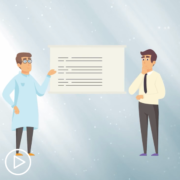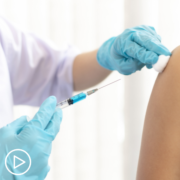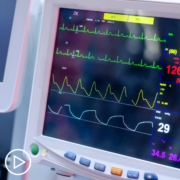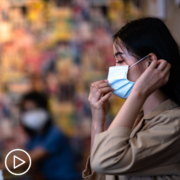What Do You Need to Know About Follicular Lymphoma?
What Do You Need to Know About Follicular Lymphoma? from Patient Empowerment Network on Vimeo.
What should you and your loved ones know after a follicular lymphoma diagnosis? This animated video provides an overview of follicular lymphoma, current treatment options, and important steps for engaging in your care.
See More from The Pro-Active Follicular Lymphoma Patient Toolkit
Related Programs:

Why Should Follicular Lymphoma Patients Seek a Second Opinion? |

Three Key Steps for Newly Diagnosed Follicular Lymphoma Patients |

|
Transcript:
What do you need to know if you or a loved one has been diagnosed with follicular lymphoma?
Follicular lymphoma is a type of B-cell non-Hodgkin lymphoma. It is typically slow-growing and can begin in the lymph nodes, bone marrow, or other organs. The disease does not always cause symptoms. But if symptoms are present, they can include swollen lymph nodes, fever, unintentional weight loss, and night sweats.
Follicular lymphoma is classified as “low grade” if the disease is slow-growing, or “high grade,” if the disease is more aggressive and growing more rapidly.
Follicular lymphoma is staged to understand where the lymphoma is in the body and to help determine which treatment options are best. There are four stages –
- Stage I, in which the lymphoma is localized in one single lymph node area or one non-lymph node site. When there is a non-lymph node site involved, an “E” is added to the stage, meaning “extra nodal.”
- In stage II, the lymphoma is in two or more areas on one side of the diaphragm. Again, “E” designation means that there is a non-lymph node site involved.
- Stage III means the lymphoma is in two or more lymph node areas above and below the diaphragm.
- And finally, stage IV is when the lymphoma is widespread, with involvement above and below the diaphragm, including at least one non-lymph node site.
Unlike in many other types of tumors, stage IV follicular lymphoma is often very treatable, because lymphomas tend to be sensitive to many different therapies.
Treatment recommendations are based on a variety of factors, including:
- Disease stage
- Tumor size and tumor grade
- Disease symptoms
- And a patient’s age and overall health
For some patients, treatment doesn’t begin right away, and an approach called “watchful waiting,” “observation,” or “active surveillance” is used to monitor the progression of the disease. This usually involves regular oncology clinic visits and lab checks – and sometimes repeat imaging scans.
When it is time to treat, options may include:
- Radiation therapy
- Chemotherapy
- Targeted therapy
- Immunotherapy
- Or cellular therapy, such as CAR T-cell therapy or a bone marrow transplant.
- Your physician may also recommend clinical trial options.
Now that you understand more about follicular lymphoma, how can you take an active role in your care?
- First, continue to educate yourself about your condition. Ask your healthcare team to recommend credible resources of information.
- Next, understand the goals of treatment and speak up about your personal preferences.
- Consider a second opinion or a consult with a specialist following a diagnosis to confirm your treatment approach.
- And, write down your questions before and during your appointments. Visit powerfulpatients.org/FL to access office visit planners to help you organize your thoughts. Bring loved ones to your appointments to help you recall information and to keep track of important details.
- Ask your doctor whether a clinical trial might be right for you.
- Finally, remember that you have a voice in your care. Don’t hesitate to ask questions and to share your concerns. You are your own best advocate.
To learn more about follicular lymphoma and to access tools for self-advocacy, visit powerfulpatients.org/Follicular.










